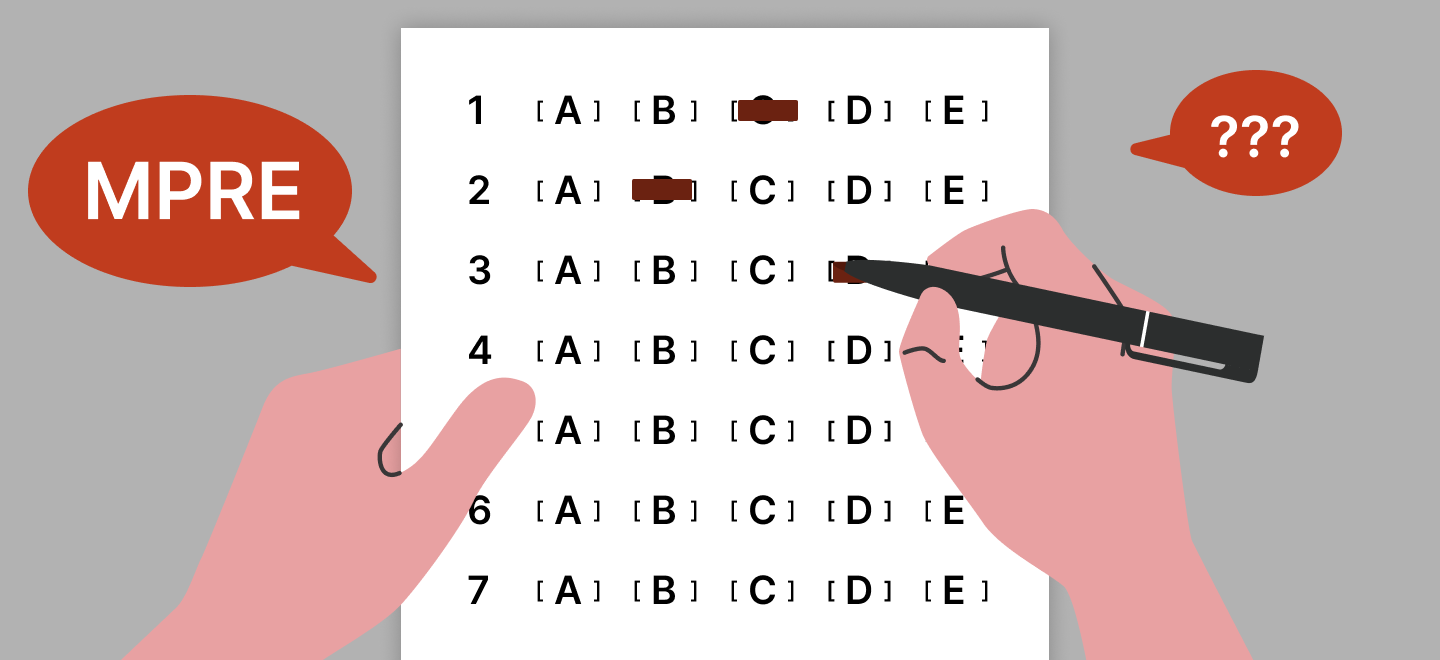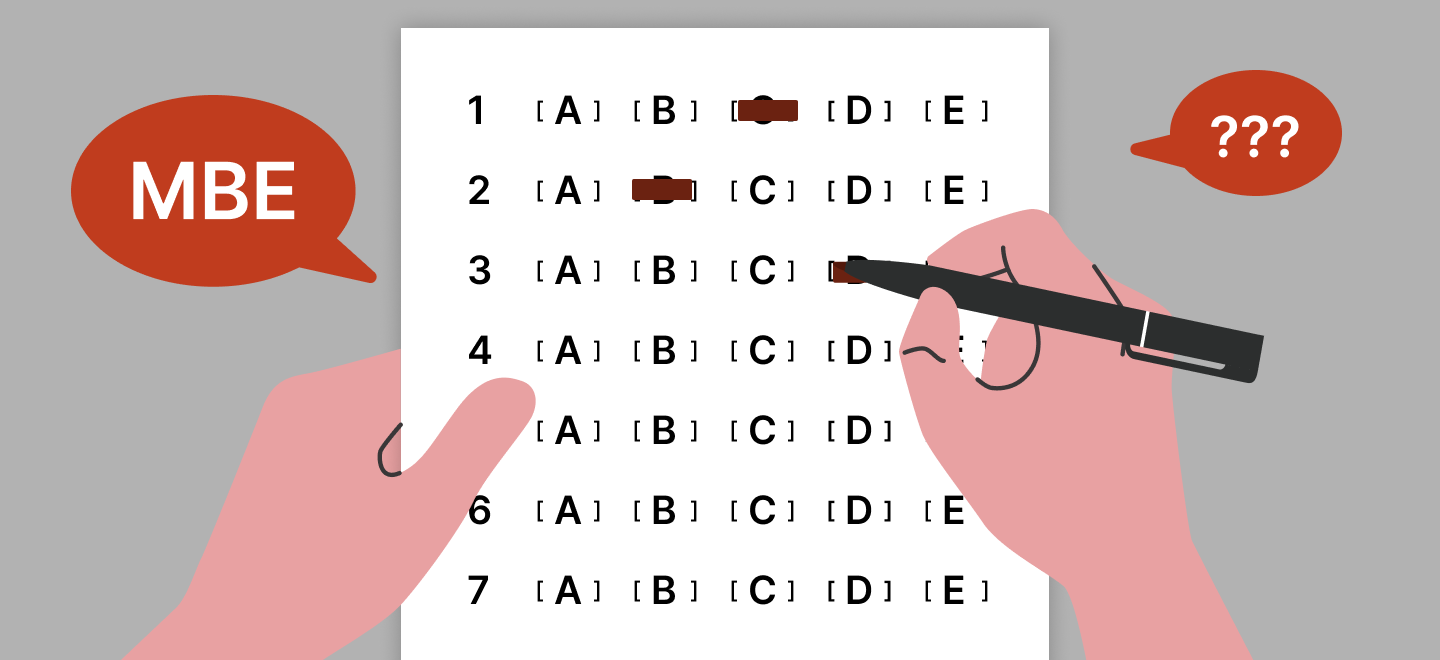Bar Exam Success
What is the MPRE? The Ultimate Guide to the Multistate Professional Responsibility Examination

The Multistate Professional Responsibility Exam (MPRE) is often the bar exam’s forgotten little sibling. The MPRE tests your knowledge of the ethics rules regarding the practice of law. The National Conference of Bar Examiners (NCBE) is the organization that administers the MPRE. According to the NCBE, the purpose of the MPRE is to “measure examinees' knowledge and understanding of established standards related to the professional conduct of lawyers.”
In this article, we’ll tell you everything you need to know about the MPRE.
For jurisdictions that require the MPRE, applicants need not take the MPRE before taking the bar exam, but they must do so and obtain a passing MPRE score before they can be admitted to the bar.
The MPRE’s questions are largely based on the American Bar Association (ABA) Model Rules of Professional Conduct and the ABA Model Code of Judicial Conduct, but they also cover relevant court decisions as well as procedural and evidentiary rules.
The MPRE consists of 60 multiple-choice questions: 50 scored questions and 10 unscored questions. As with the MBE, each question on the MPRE is followed by four possible answers. You’ll have two hours to complete the exam.
The purpose of the MPRE is to measure examinees' knowledge and understanding of established standards related to lawyers’ professional conduct. The MPRE is not a test to determine an individual’s personal ethical values. Lawyers serve in many capacities, for example, as judges, advocates, counselors, and in other roles. The law governing the conduct of lawyers in these roles is applied in disciplinary and bar admission procedures, and by courts in dealing with issues of appearance, representation, privilege, disqualification, and contempt or other censure. Courts also refer to these standards in lawsuits seeking to establish liability for malpractice, and other civil or criminal wrongs committed by a lawyer while acting in a professional capacity.
MPRE States
Although most states administer the MPRE independently of the bar exam, the MPRE is required for admission to the bars of all but three U.S. jurisdictions (Wisconsin, Maryland, and Puerto Rico). Plus, the Connecticut and New Jersey bars accept the completion of a law-school course on professional responsibility in lieu of the MPRE.
Preparing for the MPRE
Preparing for the MPRE is straightforward. You'll need both a strong familiarity with the rules and principles of professional conduct, as well as an understanding of the format of the MPRE.
How Hard is the MPRE?
The MPRE can be deceptively tricky. While many students consider the MPRE to be the easiest component of bar admission, it is not to be taken lightly. The MPRE will test you on your knowledge of the ethical rules as well as the exceptions to those rules. Approaching the MPRE with too much confidence can lead you to overlook the nuances of a lawyer’s professional responsibility. Although the MPRE might seem like a walk in the park compared to the UBE, you don’t want a failed MPRE standing between you and a law license. Thus, we strongly recommend you sign up for an MPRE prep course.
When Do I Need to Start Studying for the MPRE?
It is generally recommended that you begin your MPRE preparation at least two weeks before the exam, though three to four weeks is ideal.
MPRE Study Tips
The MPRE is similar to other standardized tests you have taken, and there are no big secrets to succeeding on the exam. However, here are just a few tips that might make your MPRE preparation a little easier:
- Check out the NCBE’s list of common terms used in MPRE prompts, as well as the MPRE Subject Matter Outline. These are great resources to ensure you know what’s coming.
- Read through the ABA Model Rules. These rules are the heart of the MRPE. If you have the time, it wouldn’t hurt to look through this primary source, in addition to taking an MPRE prep course.
- Do as many practice questions as possible and take several full-length practice exams.There’s no better way to familiarize yourself with a standardized test than to simulate the conditions of the actual test.
- Focus on the attorney in the prompt. MPRE questions will often include multiple actors and actions to throw you off. Always keep in mind that the exam is testing your knowledge of lawyers’ professional responsibilities.
MPRE Practice Questions
Passing the MPRE isn’t easy. Quimbee helps you study for the MPRE by giving you access to practice exams loaded with real MPRE questions.
Quimbee’s MPRE Prep Course
There’s no better way to prepare for the MPRE than with Quimbee MPRE Review. Quimbee MPRE Review is an intensive, 7-day MPRE prep course that will prepare you to pass the MPRE. You’ll get access to real MPRE practice questions licensed from the NCBE, complete with answer explanations. You’ll also have full access to Quimbee Outlines in all MPRE subjects. Quimbee MPRE Review comes with unlimited, 24/7 access to all MPRE study materials on PC, Mac, iPhone, iPad, and Android devices. And Quimbee MPRE Review is on demand, so you can take it anytime you want. We guarantee you’ll pass the MPRE, or you’ll get to retake our course for free.
MPRE Registration
MPRE Scores
The MPRE is scored based on a scale ranging from 50 (low) to 150 (high). Each jurisdiction sets its own minimum-passing score. Minimum-passing scores range from 75 to 86. The NCBE’s website provides further details on how the MPRE is scored.
MPRE Test Dates
The MPRE is offered three time per year, typically in March, August, and November. For details on MPRE test dates, check out the NCBE’s website.







